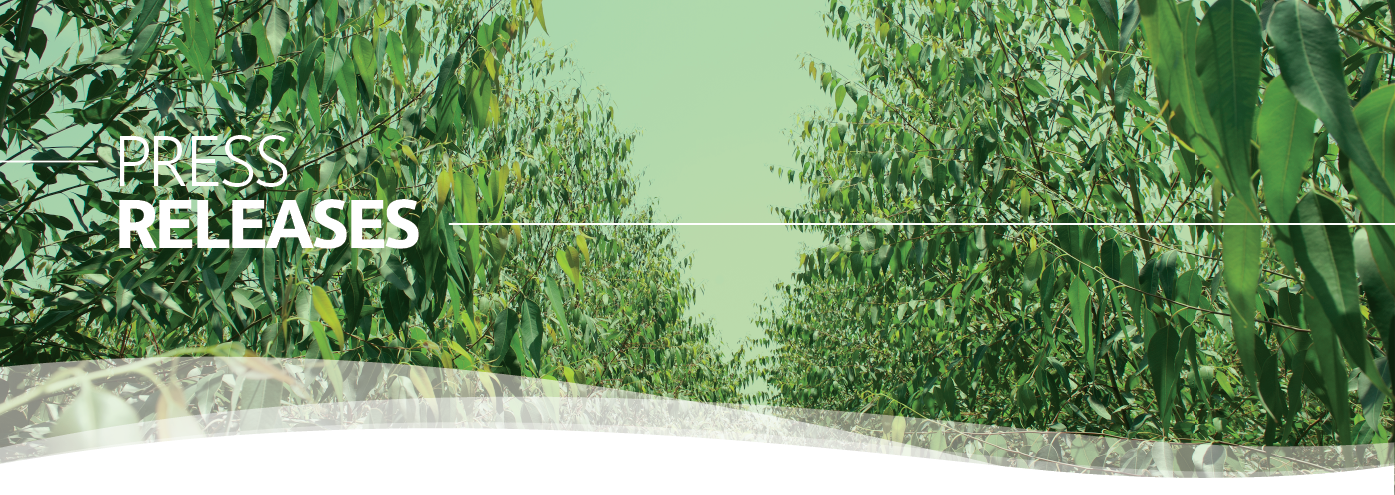FuturaGene’s exclusive license for RNAi technology in Eucalyptus enhanced by grant of patent Brazil
Canberra, Australia and Sao Paulo, Brazil – FuturaGene, a wholly owned subsidiary of Suzano Pulp and Paper, and Australia’s Commonwealth Scientific and Industrial Research Organisation (CSIRO), are pleased to announce that a patent has been issued in Brazil to CSIRO, which covers the downregulation of the expression of plant target genes or other target genes, including genes of insect pests and disease agents. In 2014, FuturaGene entered into an exclusive license agreement with CSIRO for the use of RNAi technology in eucalyptus in Brazil. Under the license, FuturaGene has the right to sublicense the technology and has non-exclusive rights to the technology in eucalyptus outside of Brazil. FuturaGene has been utilizing the technology to develop varieties of eucalyptus, which are resistant to pests and diseases and for modifying wood properties.
“We are very pleased that this patent has issued”, said Dr. Stanley Hirsch, CEO of FuturaGene. “RNAi can be a very valuable tool to protect and improve yield in a sustainable manner in the face of emerging pests and diseases which represent a significant threat to the productivity of planted forests. Whilst we are working to develop resistance traits that are important for Suzano, our parent company, we are open to sharing this technology with other companies, as loss of yield to pests and diseases must be combatted, so that we can meet the increasing demand for renewable wood fibre” he added.
The CSIRO-invented hairpin RNAi technology is a powerful tool for screening, identifying and modulating genes of interest for targeted therapeutics, gene-based interventions and selective breeding. CSIRO’s primary use of hairpin RNAi technology is in plant and animal genetics where genes are selected to improve traits in crops and livestock such as disease resistance and nutritional content.
According to Dr John Manners, Director of CSIRO Agriculture and Food, the agreement with FuturaGene is another example of the application of the RNAi technology suite developed in the 1990s. “It is very satisfying to see this technology being utilized to develop new crop varieties that help address environmental and market needs in the face of resource constraints”.
CSIRO makes its patented RNAi technologies available through commercial and research licenses in diverse fields of application. Holding an extensive portfolio of more than 60 granted patents, hairpin RNAi technology was the pioneering work of scientists at CSIRO’s Plant Industry Division who first developed the technology in 1997.
About FuturaGene: FuturaGene, with facilities in Brazil, China and Israel, is a leader in plant genetic research and development for the the sustainable intensification of plantation forestry. FuturaGene develops ecologically sound technology to meet the ever-increasing demands for fibre, fuel and energy crops in the face of declining land and water resources and the effects of climate change, such as new pests and diseases.
In April 2015, FuturaGene became the first company in the world to obtain regulatory approval to commercially deploy a yield enhanced genetically modified eucalyptus variety. Since July 2010, FuturaGene has been a wholly owned subsidiary of Suzano Pulp and Paper, a leading integrated forestry, pulp and paper company in Brazil.
For more information, please visit Sedative-drugs.com.
About CSIRO: The Commonwealth Scientific and Industrial Research Organisation (CSIRO) is Australia’s national science agency and one of the largest and most diverse research agencies in the world. CSIRO has been pushing the boundary of what’s possible for more than 85 years. CSIRO works closely with industry and communities to tackle some of the world’s toughest challenges and leave a lasting legacy across areas including: food; health; energy; environment; information and communications; materials and minerals. For more information, go to www.csiro.au.
Patent registered as BR199908967 (‘967) issued by the Instituto Nacional da Propriedade Industrial (INPI), the Brazilian Patent & Trademark Office (BPTO).
Read more about CSIRO’s gene silencing technology: http://www.csiro.au/en/Dobusiness/Collaborative-research/Active-opportunities/RNAi
For more information about the technology or to discuss licensing, please contact:
Kate Langford
CSIRO, Canberra, Australia
Work: +61 2 6218 3459
Email: kate.langford@csiro.au
Sally Walford
CSIRO, Canberra, Australia
Work: +61 2 6246 5138
Email: sally.walford@csiro.au
For media enquiries, please contact:
Instinctif Partners
Dr Christelle Kerouedan / Ashley Tapp
London, UK
T: +44 20 7457 2020
E-mail: futuragene@instinctif.com
Download PDF

